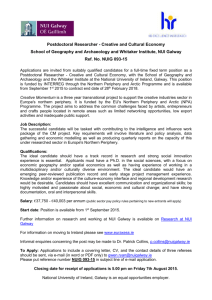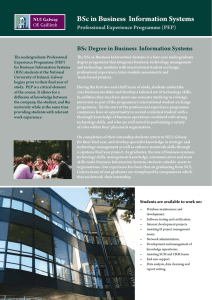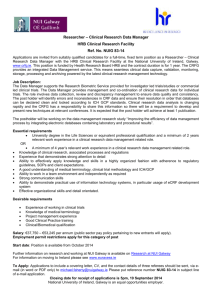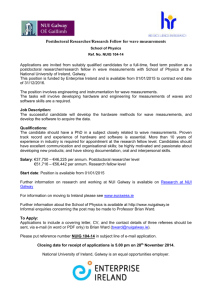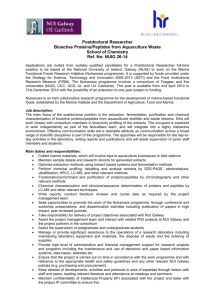Contributors to the MSc in Biomedical Science (via Distance Learning) Dr. Una Fitzgerald
advertisement
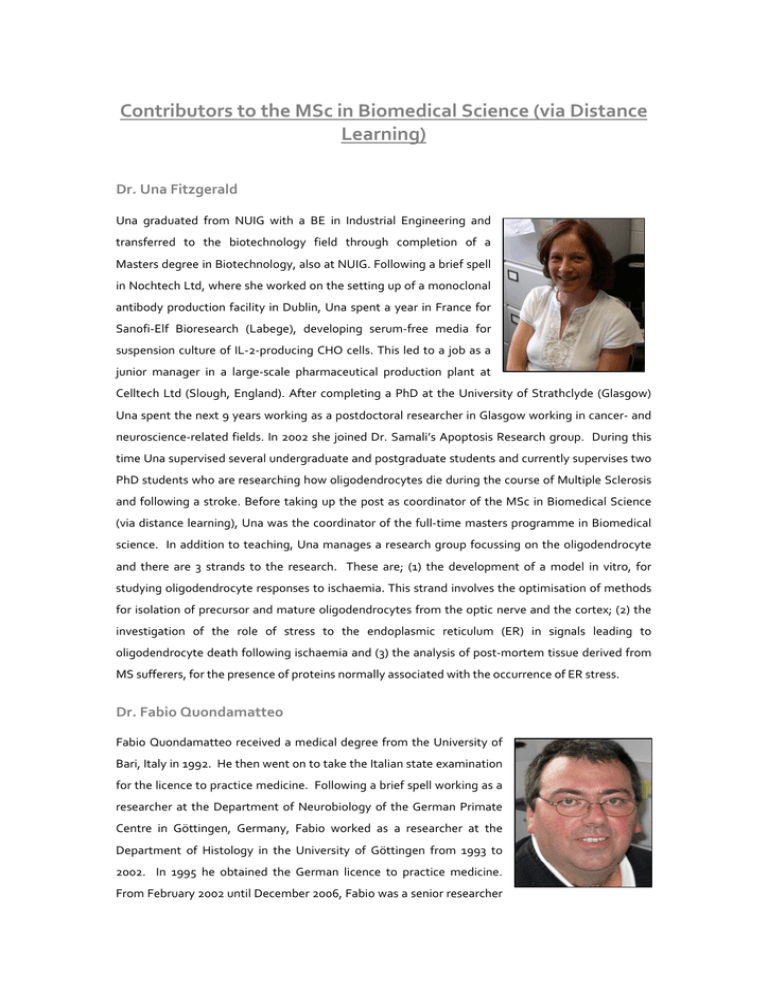
Contributors to the MSc in Biomedical Science (via Distance Learning) Dr. Una Fitzgerald Una graduated from NUIG with a BE in Industrial Engineering and transferred to the biotechnology field through completion of a Masters degree in Biotechnology, also at NUIG. Following a brief spell in Nochtech Ltd, where she worked on the setting up of a monoclonal antibody production facility in Dublin, Una spent a year in France for Sanofi‐Elf Bioresearch (Labege), developing serum‐free media for suspension culture of IL‐2‐producing CHO cells. This led to a job as a junior manager in a large‐scale pharmaceutical production plant at Celltech Ltd (Slough, England). After completing a PhD at the University of Strathclyde (Glasgow) Una spent the next 9 years working as a postdoctoral researcher in Glasgow working in cancer‐ and neuroscience‐related fields. In 2002 she joined Dr. Samali’s Apoptosis Research group. During this time Una supervised several undergraduate and postgraduate students and currently supervises two PhD students who are researching how oligodendrocytes die during the course of Multiple Sclerosis and following a stroke. Before taking up the post as coordinator of the MSc in Biomedical Science (via distance learning), Una was the coordinator of the full‐time masters programme in Biomedical science. In addition to teaching, Una manages a research group focussing on the oligodendrocyte and there are 3 strands to the research. These are; (1) the development of a model in vitro, for studying oligodendrocyte responses to ischaemia. This strand involves the optimisation of methods for isolation of precursor and mature oligodendrocytes from the optic nerve and the cortex; (2) the investigation of the role of stress to the endoplasmic reticulum (ER) in signals leading to oligodendrocyte death following ischaemia and (3) the analysis of post‐mortem tissue derived from MS sufferers, for the presence of proteins normally associated with the occurrence of ER stress. Dr. Fabio Quondamatteo Fabio Quondamatteo received a medical degree from the University of Bari, Italy in 1992. He then went on to take the Italian state examination for the licence to practice medicine. Following a brief spell working as a researcher at the Department of Neurobiology of the German Primate Centre in Göttingen, Germany, Fabio worked as a researcher at the Department of Histology in the University of Göttingen from 1993 to 2002. In 1995 he obtained the German licence to practice medicine. From February 2002 until December 2006, Fabio was a senior researcher at the Department of Histology in the University of Göttingen. During his period of employment in the University of Göttingen, he received an M.D. degree in 1997, a “Facharzt für Anatomie” (Specialist in Anatomy) degree in 1998 and a postdoctoral lecture qualification in 2001. In 2001 he participated in a teaching course of the Anatomical Society. He was awarded “Best Lecturer of the year 2006 in Anatomy” by the medical student association of the University of Göttingen. In January 2007, he took up the post of Senior Lecturer at the Department of Anatomy at NUI, Galway. In March of this year, Dr. Quondamatteo was appointed Vice Dean for Human Biology at the School of Medicine at NUI, Galway. Dr. Kathryn Cormican Kathryn Cormican (Ph.D.) is a lecturer in the College of Engineering & Informatics at the National University of Ireland Galway. Her research interests lies in the areas of enterprise integration and technology innovation. Kathryn leads a number of European Union and industry funded research projects in this area. She has published over forty papers at international conferences and peer reviewed journals. Kathryn works closely with many leading organizations and SMEs helping them to diagnose, develop and deploy new processes and systems. Dr. Brendan Wilkins Brendan received his B.Sc. (Hons) in Biochemistry from U.C.G. He completed his Ph.D. in Cell Biology at Baylor College of Medicine in Houston, Texas, USA where his dissertation research was on proteins that interact with sperm during fertilization. After completing a postdoctoral fellowship in medical education, he returned to Ireland. Brendan was involved in the early stages in the establishment of the NCBES and the fulltime M.Sc. Biomedical Science program. His research interests now include factors that determine cell phenotype in the cardiovascular system, and 3D cell culture and cell patterning. Dr. Yury Rochev Yury obtained an honours Master of Science degree in Biophysics (1984) at Moscow State University, Russia. In 1990 he was awarded a Doctorate in Biophysics in the Institute Biological Physics, Soviet Academy of Science. He has worked at the Institute Biological Physics Soviet Academy of Science Pushchino, Pushchino State University (Russia), Chemistry Department NUI Dublin and NCBES, NUI Galway. His current research interests include design and development new biomaterials, drug delivery systems and tissue engineering products. He manages a biomaterial cluster for surface analysis and characterisations involving electron microscopy, confocal microscopy, nanohardness testing, atomic force microscopy etc. Yury has close collaboration with the biomedical industry, for more than the last 15 years. As a deputy director of the Institute of Theoretical and Experimental Biophysics he was curator of the preclinical and clinical testing of a new class of wound dressing materials. Dr. Rochev taught courses in Pushchino State University and Moscow State University on Biophysics, Biomaterials and Tissue Engineering. He was also the organiser of the Master degree program “Advanced biomaterial and tissue engineering” in Pushchino State University. Currently he teaches courses in Biomaterials, Biostatistics and is an instructor for the Surface Analysis practical, which are delivered as part of the MSc in Biomedical Science programmes. William Brennan BE, MIEI, C&G Cert William is a qualified Mechanical & Biomedical Engineer. He also holds a certificate in Electronic Engineering, as well as being a qualified Fitter/Welder and a qualified Mechanical Engineering Technician. William has worked as an Experimental Officer (Engineering) at the NCBES since 2000, and also lectures in Engineering for NUIG, GMIT and The City & Guilds of London Institute. William will direct the Biomechanics practical. Dave Connolly BSc, MSc., H.Dip. Appl. Sc. After graduating with a BSc in Microbiology & Physiology in 1995 (NUIG), David obtained a H. Dip in Applied Microbiology and a MSc in Biochemistry (both from NUIG). Working as a research officer for several years at the National Diagnostic Centre in Galway, David applied functional genomics in the study of stress in aquaculture and used real‐time PCR to analyse muscle gene expression in animals. Dave will direct the Cell Culture & Confocal Microscopy practical and together with Enda O’Connell, will manage the Microbiology & Cloning practical. Brendan Harhen BSc, MSc Brendan graduated with a BSc in Biochemistry in 1987 from NUIG and went on to obtain a MSc in Biotechnology in 2001 from UCC. After a brief stint in industry he joined a group at the mater hospital in Dublin using mass spectrometry for clinical pharmacology and biochemical analysis. He worked for 10 years in the Royal College of Surgeons in Dublin setting up advanced bioanalytical platforms for ultratrace mass spectrometric‐based analysis of biomolecules and proteins before moving briefly to UCD. In 2004 he joined the NCBES as an experimental officer with responsibility for mass spectrometry. Brendan will direct the Mass Spectrometry practical. Howard Fearnhead BSc, PhD Howard graduated in 1991 with a BSc in Toxicology and Pharmacology, from University College, London. He then spent three years at the Medical Research Council Toxicology Unit of Leicester University, researching his PhD thesis which focussed on thymocyte apoptosis. This led to a postdoctoral Fellowship in Dr. Yuri Lazebnik’s lab at Cold Spring harbour Laboratory, New York. During this time his research centred on mechanisms of caspase activation. In 1999, Howard obtained a position as a Tenure Track Investigator, Apoptosis Section, in the Protein Signalling and Dynamics Laboratory at NCI‐Frederick. Howard joined the Cell Stress & Apoptosis Research Group based in the NCBES, towards the end of 2004 and since then has been expanding his caspase‐related research. Throughout his research career he has superved undergraduate, post‐graduate and postdoctoral researchers and will be contributing to the module in Molecular Medecine (BES554). Enda O’ Connell BSc (PhD pending) In 2000, Enda graduated with a BSc in Industrial Microbiology from UCD and has since worked towards a PhD in Molecular Microbiology (UCD), focusing on the application of micro‐array technology to characterise the expression of equine virulence factors. Enda joined the NCBES in 2005, where his responsibilities include management of the micro‐array facility. Enda will direct the Molecular Biology practical in addition to co‐managing the Microbiology & Cloning practical. Ger O’ Connor BSc, PhD Ger graduated from NUI Galway in Experimental Physics (1989) and obtained a Ph.D in optical spectroscopy of semiconductor thin films, from NUI Galway in 1994. This study was supported under the Optronics Ireland Programme for Advanced Technology funded by Enterprise Ireland. Following graduation, worked as a Materials Scientist with the National Microelectronics Research Centre (NMRC) in Cork. Returned to Galway in late 1995 and was Centre Manager at the National Centre for Laser Applications (NCLA). Continued in this role until appointed as a Lecturer in the Department of Experimental Physics at NUI Galway in January 2005. Maintains a close collaboration with the NCLA and currently acts as the Director of Fundamental Research at NCLA. Current research interests include short pulse laser ablation using femtosecond and nanosecond laser sources and hybrid laser processing using assisted laser ablation. Interested in industrial applications of laser technology, particularly the application to micron and nanometre scale fabrication of semiconductors, metals and polymers. Also interested in aspects of laser safety, technology transfer and advanced manufacturing. Ger will direct the Lasers practical. Eadaoin Timmins BSc, PhD Eadaoin worked for 7 years in the industrial food and pharmaceutical sectors, before going to Wales to complete a BSc in Biological Science at the University of Wales (Cardiff) followed by a PhD in Analytical Chemistry at the University of Wales (Aberystwyth). On her return to Ireland she worked as a postdoctoral researcher at the National Diagnostic Centre in Galway. In 2001, Eadaoin joined the NCBES, where she has responsibility for specialist microscopy equipment including the SEM and TEM. Eadaoin will direct the SEM practical. Dr. Ralf Zwacka, Lecturer Dr. Ralf Zwacka graduated in 1990 with a B.Sc. (Biochemistry and Applied Molecular Biology) from the University of Manchester, UK after having studied Biochemistry first in Berlin, Germany and then Manchester. Upon completion of his degree in July 1990, he worked in the Central Research Unit of Roche in Basle, Switzerland for 3 months as part of their internship program for students. After completion of the internship at Roche he was offered a Ph.D. position with Prof. Hans Weiher at the Research Centre Karlsruhe, Germany. He started the project “The Human Homologue of the Murine Glomeruloclerosis Gene Mpv17” in December 1990. The project was carried out in cooperation with Dr. Hartmut Land from the Cancer Research UK (then ICRF) Institute at Lincoln's Inn Field, London During his Ph.D. project he analysed the transgenic mouse strain Mpv17 that develops kidney disease closely resembling the human condition known as nephrotic syndrome, which is a frequent complication of diabetes. He found that the Mpv17 protein localises to peroxisomes and is involved in reactive oxygen species metabolism. He has also shown that the human gene can rescue the murine phenotype and that Matrix‐Metalloproteinase (MMP)‐2 is regulated by the Mpv17 protein. In 1995, Dr. Zwacka was awarded a postdoctoral fellowship at the University of Pennsylvania in the Institute for Human Gene Therapy to investigate the role of redox‐modulating enzymes (MnSOD, CuZnSOD, Catalase) in liver ischaemia/reperfusion (I/R) injury in the liver and their potential therapeutic use. Furthermore, Dr. Zwacka could show that CD4+ T‐cells are implicated in the inflammatory response after I/R damage to the liver. Dr. Zwacka returned to the UK to take up a faculty position as a Lecturer at the University of Edinburgh, Department of Oncology in August 1997. This was a fixed term non‐clinical lecturer appointment. There, he began to transfer the Gene Therapy technology to the design and development of strategies to combat colorectal cancer. He investigated different novel approaches that were based on adenoviral gene transfer combined with chemo‐and immunotherapy approaches. During his time in Edinburgh, he was also able to complete an MBA degree at the University of Edinburgh Management School. His specialisations included finance, strategic management and innovation management. He wrote a business plan for a small biotech start‐up company for his MBA thesis. In 2001 Dr. Zwacka was awarded an Emmy‐Noether fellowship from the Deutsche Forschungsgemeinschaft (German Research Foundation) to set up his research group at the University of Ulm, Germany. With the Emmy‐Noether grant, Dr. Zwacka established an active and dynamic research group working on the molecular mechanisms of drug induced apoptosis in colorectal cancer, the redox‐regulation of signal transduction pathways in tumours, and potential gene therapy approaches. His group studied the mechanisms behind the anti‐proliferative effects on MnSOD, and have found that it causes p53‐dependent senescence. Furthermore, the group focused on the potential application of adeno‐associated viral vectors for the treatment of colorectal cancer. Since June 2005 Dr. Zwacka is at the NCBES in Galway continuing his work on colon cancer and gene therapy. Dr. Thomas Ritter Dr Thomas Ritter, leader of research programme, was recruited by the National University of Ireland, Galway, College of Medicine, Nursing and Health Sciences, School of Medicine as lecturer in Medicine and assumed his position in March 2005. Dr. Ritter has over 14 year experience in the field of gene therapy in organ transplantation. He obtained his Ph.D. degree in 1994 from the Max‐Planck Research group of Immunology/Rheumatology at University of Erlangen‐ Nuremberg, Germany. Having completed his Post‐Doctoral Fellowship at Marseille, Center of Immunology in 1995, Dr. Ritter took up a faculty position at the prestigious Charité – University Hospital Berlin). He worked as a leader of the gene therapy in experimental transplantation group in the Institute of Medical Immunology under the directorship of Prof. Dr. H.‐D. Volk. His research focused on the development of efficient viral gene‐transfer systems (Adenovirus, Retrovirus, Lentivirus) for application in transplantation medicine. Dr. Ritter was successful in obtaining funding from the German Research Foundation and the Ministry of Health and Research as well as from industry (Schering). His teaching duties in this position included courses in cellular and molecular immunology for biology students of biology, practical training courses in Microbiology/Virology/Immunology for medical students and lectures in “Gene therapy in medicine and research” for advanced students of Medicine and Biology. Moreover Dr. Ritter has successfully trained more than 10 researchers and completed his “Habilitation” (postdoctoral lecture qualification) in Immunology in 2002 followed by a promotion to assistant professor in 2003. Shortly after his arrival in Galway, Dr. Ritter has attracted significant funding from Science Foundation of Ireland and Health Research Board. Currently he supervises 7 researchers in his lab with the aim to develop novel, short‐term therapies to prevent allogeneic graft rejection. He is also teaching immunology and gene therapy in various undergraduate and post‐graduate courses at NUIG and hosted several M.Sc. students for their research projects in his lab. Dr. Ritter has published more than 60 research articles in international peer‐reviewed journals, 11 review articles, one editorial and has contributed a chapter to one book. In addition he has been invited to give more than 30 invited presentations and lectures, has more than 60 abstracts to his name and has served as a reviewer for 11 international journals. Recently Dr. Ritter has been appointed as Senior Lecturer in Medicine at NUIG. Dr. Linda Howard Dr. Howard completed her post doctoral fellowships in the Cellular Biochemical and Biophysics laboratory at Memorial Sloan Kettering Cancer Center, New York (1997‐2000) and at the Lombardi Cancer Center, Georgetown University Medical Center, Washington DC (1995‐1997). These projects studied the mechanisms involved in regulating the activation of cell surface proteolytic enzymes and their roles in facilitating invasion by metastatic tumour cells. Before joining REMEDI Dr. Howard worked for 4 years with Osiris Therapeutics Inc. Baltimore, studying the potential therapeutic utility and biology of Mesenchymal Stem Cells (MSCs) derived from adult tissue. This research included developing assays to measure differentiation‐specific changes in gene expression, optimising the isolation, expansion and characterisation of MSCs from different species as well as assays to quantify transplanted MSCs persisting in host animals. Since joining REMEDI she has continued her research with MSCs and is investigating the changes which occur during stem cell differentiation with particular emphasis on elucidating novel mechanisms of regulating differentiation. John Kelly BSc, PhD John has a BSc in Applied Biology from the University of East London and a Phd in Neuropharmacology (NUIG). He has spent 25 years in pharmacological and toxicological research, starting with 8 years in a pharmaceutical company in the UK. After obtaining a PhD. John worked initially as a postdoctoral researcher, and then as a lecturer within the Department of Pharmacology at NUIG. Current areas of research include the mechanisms of action of antidepressants using preclinical models, developing alternatives to laboratory animals for acute toxicity assessment, and the effects of MDMA (“Ecstasy”) on neurochemical, behavioural and immune parameters. Dr J.J. Tobin J. J. Tobin is a graduate of NUIG, holding B.Sc. and Ph.D. degrees in biochemistry. He worked for 19 years with the in vitro diagnostics manufacturer, Olympus Diagnositica, where he held various management positions in Technical Support and Research & Development. During this time he gained considerable practical experience of regulatory requirements, such as ISO and FDA‐QSR, as they impacted on the development, manufacture and market‐launch of new product lines to European, American and Asian markets. J. J. now runs his own consultancy business, ChemHaz Solutions Ltd., which helps clients comply with the various regulations governing the supply, transport and disposal of products that contain hazardous materials. Dr Aidan Flanagan Aiden Flanagan is a Principal Development Engineer in the R&D Department in Boston Scientific Corporation Galway and specializes in technology and process development. He has extensive experience in developing technologies such as various laser applications, drug delivery, drug and polymer coating processes, and design of minimally invasive medical devices. He is also skilled at statistical analysis, experimental design, and intellectual property generation. Aiden obtained a BSc(Hons) in Experimental Physics & Mathematics from NUI Maynooth in 1988. He then moved to Queens University in Belfast and was awarded an M.Sc. in Optoelectronics and Information Processing in 1989 where he performed development work on a Laser Anemometer for measuring cochlear artery blood flow. Aiden obtained a Ph.D. in Experimental Physics from NUI Galway 1994 on the development of a Laser Soldering Process in conjunction with Digital Equipment Corporation; during his time at Digital Aiden gained extensive experience in the use of Design of Experiment techniques. After his Ph.D Aiden performed consultancy work for Panasonic Technologies (MIT) on thermal modelling of laser heated solder paste. Aiden then moved to Cork to work for Summit Technology on the manufacture of Excimer lasers that are used for Laser Keratectomy of vision impaired eyes; at this point he started delivering a course for employees on Statistical Process Control and Design of Experiments. It was in 1995 that Aiden joined Boston Scientific working for a period in the R&D labs in Boston before returning to Galway to be part of the new BSC R&D facility in Galway. During his time at BSC Aiden has developed many technologies and has become a Black Belt in Six Sigma; he has focussed on Design for Six Sigma techniques such as Variation Transmission Analysis. He regularly delivers a Hands‐on Statistics course for employees. In 2007 Aiden wrote and delivered the Statistical Analysis and Experimental Design module for the M.Sc. course in Biomedical Engineering Science in NUI Galway. Aiden has also pioneered the use of novel techniques in idea generation and innovation in the corporation; he holds 9 Patents and has 30 Patents pending. In 2008 he was awarded the Outstanding Patent Award in BSC for ideas that generate a significant increase in revenue. Prof. Peter McHugh Peter McHugh is Professor of Biomedical Engineering at NUI Galway. He obtained his B.E. in Mechanical Engineering from UCG (1987). He then did graduate study at Brown University, USA, where he obtained an Sc.M. (1990) and a Ph.D. (1992), in the area of mechanics of solids. He returned to NUI Galway as a Lecturer in 1991; he was promoted to Senior Lecturer in 1997 and to Personal Professor in 2004. He was appointed to the newly created Established Professorship of Biomedical Engineering in 2007, and he was appointed Head of the Department of Mechanical and Biomedical Engineering in 2008. Professor McHugh has been a leader in research, having been intimately involved in the development of biomedical science and engineering at NUI Galway and nationally, and he has been Research Director for Biomechanics in NUI Galway’s National Centre for Biomedical Engineering Science (NCBES) since its foundation in 1999. He has authored or co‐authored over 320 publications, including 75 peer‐reviewed journal articles, has given over 40 invited lectures/presentations internationally, has graduated 12 Ph.D. and 20 research masters students, and has generated over €7m in research funding from national, EU and industry sources. He was awarded the prestigious Alexander von Humboldt Fellowship in 1995 for a Sabbatical stay in Germany, and was awarded Chartered Membership of Engineers Ireland in 1996. His early research efforts were focused on computational modelling, micromechanical modelling and experimental testing of metallic materials and metallic based composites, and his research activities are now focused on biomedical engineering applications, applying computational and experimental mechanics to investigating medical devices, tissue and the interaction of tissue with implanted devices. Professor McHugh is a member of the Royal Irish Academy National Committee for Engineering Sciences, the Irish Research Council for Science, Engineering and Technology and the Council for the Section of Bioengineering, Royal Academy of Medicine in Ireland. Prof. Abhay Pandit Prof. Abhay Pandit is a Professor in Biomedical Engineering and the Director of the Network of Functional Biomaterials, a newly formed research centre, at NUI Galway. He is also affiliated with the National Centre for Biomedical Engineering Science at NUI, Galway. Prof. Pandit has over twenty years of experience in the field of tissue engineering. After graduating with a First Class honours B.E. degree in Biomedical Engineering from the University of Bombay, India, he pursued his postgraduate degrees (Biomaterials Track) under the guidance of Prof. Dale Feldman at the University of Alabama at Birmingham, USA. His postgraduate work focused on developing a scaffold for wound healing applications. The project involved the modification of a fibrin scaffold to deliver a therapeutic biomolecule. This research resulted in a clinical trial at the Burn Centre at the University of Alabama at Birmingham. Prof. Pandit’s subsequent research in the Wound Care R & D Group at The Kendall Company resulted in a patent and FDA approval for a commercial wound dressing. Prof. Pandit also led the Biomaterials Research Group at Surgical Sealants, Inc. where he received IDE approval for a collagen‐based vascular sealant. He recently was the principal investigator for a tissue‐engineered heart valve project (NIST Funded US $2M) at St. Jude Medical, Inc. Prof. Pandit also holds a Masters in Public Health Degree from the University of Alabama at Birmingham. He has authored over sixty refereed publications. He is also an active member of a number of scientific societies and serves on the editorial board of four journals. Current research includes funded projects by Science Foundation Ireland, European Commission, Enterprise Ireland, Health Research Board and The Royal Irish Academy on nanomedicine and tissue engineering approaches for clinical applications including wound healing, neural, cardiovascular, musculoskeletal and soft tissue repair. His current research group consists of thirty researchers. Despite his research commitments, he enjoys teaching Tissue Engineering to the eager students in the Masters program in Biomedical Science at the NCBES. Marie Coggins Graduated from Sligo Institute of Technology with a BSc in Environmental Science and Technology (1995). Obtained an MSc from the Department of Biology and Biochemistry, Queens University Belfast (1996) and holds a Ph.D. from the Department of Physics NUI Galway (2000). Also, awarded a certificate of operational competence in occupational hygiene (LFOH) from the British Occupational Hygiene Society. Worked as an occupational hygienist for Eli Lilly S.A. Pharmaceutical. Currently lecturing Occupational Hygiene and Chemical safety at NUI Galway. Works as a researcher with the Air Quality Technology Centre, and is currently working with many Industries on Occupational Health and safety related projects. Research Interests Research interests include measurement of environmental and occupational hazards. Currently working with the Pharmaceutical industry on the development of chemical control and containment designs. Peter Dockery Peter Dockery received a BSc in Biology from the University of Strathclyde in 1981. He obtained a PhD in Anatomy (1986) from the University of Aberdeen. Postdoctoral work was undertaken on the human endometrium at the Harris Birthright Centre for Reproductive Medicine, Department of Anatomy and Cell Biology, University of Sheffield. In 1988 he was appointed Lecturer in the Department of Biomedical Science University of Sheffield. In 1990 was appointed Lecturer at the Department of Anatomy University of Hong Kong. In 1995 was appointed Lecturer in the Department of Anatomy University College Cork. Then Statutory Lecturer in the Department of Anatomy University College, Cork in 2001. He joined the BioScience Institute when it opened in September 2002. He was appointed as director of the Advanced Microscopy Research Facility in the Neuroscience/Anatomy Section of the BSI. In July 2005 took up post as Professor of Anatomy at NUI‐ Galway.

